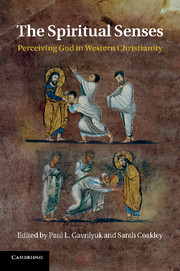Book contents
- Frontmatter
- Contents
- Contributors
- Foreword
- Abbreviations
- Introduction
- Chapter 1 Origen of Alexandria
- Chapter 2 Gregory of Nyssa
- Chapter 3 Augustine
- Chapter 4 Gregory the Great
- Chapter 5 Pseudo-Dionysius the Areopagite
- Chapter 6 Maximus the Confessor
- Chapter 7 Alexander of Hales
- Chapter 8 Thomas Gallus
- Chapter 9 Bonaventure
- Chapter 10 Thomas Aquinas
- Chapter 11 Late medieval mystics
- Chapter 12 Nicholas of Cusa
- Chapter 13 Jonathan Edwards and his Puritan predecessors
- Chapter 14 John Wesley
- Chapter 15 Karl Rahner and Hans Urs von Balthasar
- Chapter 16 Analytic philosophers of religion
- Select bibliography
- General index
- Index of select biblical references
- References
Chapter 15 - Karl Rahner and Hans Urs von Balthasar
Published online by Cambridge University Press: 05 December 2011
- Frontmatter
- Contents
- Contributors
- Foreword
- Abbreviations
- Introduction
- Chapter 1 Origen of Alexandria
- Chapter 2 Gregory of Nyssa
- Chapter 3 Augustine
- Chapter 4 Gregory the Great
- Chapter 5 Pseudo-Dionysius the Areopagite
- Chapter 6 Maximus the Confessor
- Chapter 7 Alexander of Hales
- Chapter 8 Thomas Gallus
- Chapter 9 Bonaventure
- Chapter 10 Thomas Aquinas
- Chapter 11 Late medieval mystics
- Chapter 12 Nicholas of Cusa
- Chapter 13 Jonathan Edwards and his Puritan predecessors
- Chapter 14 John Wesley
- Chapter 15 Karl Rahner and Hans Urs von Balthasar
- Chapter 16 Analytic philosophers of religion
- Select bibliography
- General index
- Index of select biblical references
- References
Summary
The fact that the ‘doctrine of the spiritual senses’ serves an important function for numerous patristic and medieval theologians may not surprise contemporary scholars. What might be unexpected, however, is the high level of significance the doctrine has for the two most influential Catholic theologians of the twentieth century: Karl Rahner and Hans Urs von Balthasar. In his 1996 article on the topic, Stephen Fields draws long-overdue scholarly attention to the versions of the doctrine found in Balthasar and Rahner, highlighting their divergent readings of Bonaventure as his key point of contrast. At the conclusion of his study, however, Fields indicates that more work needs to be done on this subject. Most intriguingly, he suggests that Rahner's investigations into the spiritual senses ‘may have inspired [his] idea of the pre-apprehension’, referring to Rahner's notion of the Vorgriff auf esse, first developed in Spirit in the World.
Although I make some qualifications regarding this hypothesis below, I argue in this chapter that the spiritual senses do eventually come to inform a reworked version of this aspect of Rahner's theology. This claim not only suggests that one of the core features of Rahner's theological anthropology was influenced by his study of the spiritual senses; it also helps to account for the seeming disappearance of the doctrine from Rahner's theological considerations after 1934, as I suggest that it had an ongoing, albeit ‘subterranean’, influence on Rahner's thought.
- Type
- Chapter
- Information
- The Spiritual SensesPerceiving God in Western Christianity, pp. 257 - 274Publisher: Cambridge University PressPrint publication year: 2011
References
- 1
- Cited by



